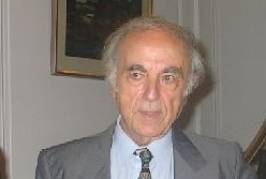 Baruch Tenembaum
Baruch TenembaumPeople who were saved from death during the Holocaust have a moral obligation to identify their rescuers, despite the trauma such recollections can cause, the founder of the International Raoul Wallenberg Foundation said on Tuesday.
The comments comes amid an eleventh-hour effort by the New York-based non-profit organization to identify more heroes at a time when the number of survivors continues to dwindle.
”We talk a lot about the Holocaust, but we do not talk enough about those non-Jews who saved Jews during the war,” Baruch Tenembaum, founder of the International Raoul Wallenberg Foundation, said in an interview with The Jerusalem Post.
The Argentinean-born Tenembaum said Holocaust survivors who were saved by others had a moral obligation to tell their stories before it was too late, despite the suffering it might cause them in reliving tortuous experiences from six and seven decades ago.
”The freedom they have now to speak or not to speak is the freedom granted to them by the person who saved them,” he said. ”In my opinion, they do not have such an option because it belongs to the person who saved them. They do not have the right to remain silent.”
The Wallenberg Foundation, which has located scores of rescuers, recently encountered four survivors – grandmothers now living in Israel, Argentina, Hungary and France – who do not want to recount the story of their rescues because it is too painful for them.
Tenembaum concedes that he can never feel their pain, noting that they have not even told their children about their experiences, but said that these people – and many others like them – need to go public with their stories before time runs out.
”The Jewish nation has a moral obligation to be grateful to those who saved lives,” he said.
About 250,000 Holocaust survivors live in Israel.
The organization, named after the Swedish diplomat who went missing in January 1945, after saving tens of thousands of Jews and other persecuted by the Nazis, develops educational programs based on the values of solidarity and civic courage, ethical cornerstones of Holocaust rescuers.
Irena Steinfeld, the head of the Righteous Department at Jerusalem’s Yad Vashem Holocaust Memorial, concurred Tuesday that survivors had a duty to speak out, but cautioned against self-righteousness.
”Certainly it is the moral obligation of survivors to tell the story of their rescuers, but I am very cautious because it is very easy to open old wounds and hard to close them again,” she said.
”We can only try to ask them in every way possible.”
More than 22,000 people have been recognized by Yad Vashem as Righteous Among the Nations.
